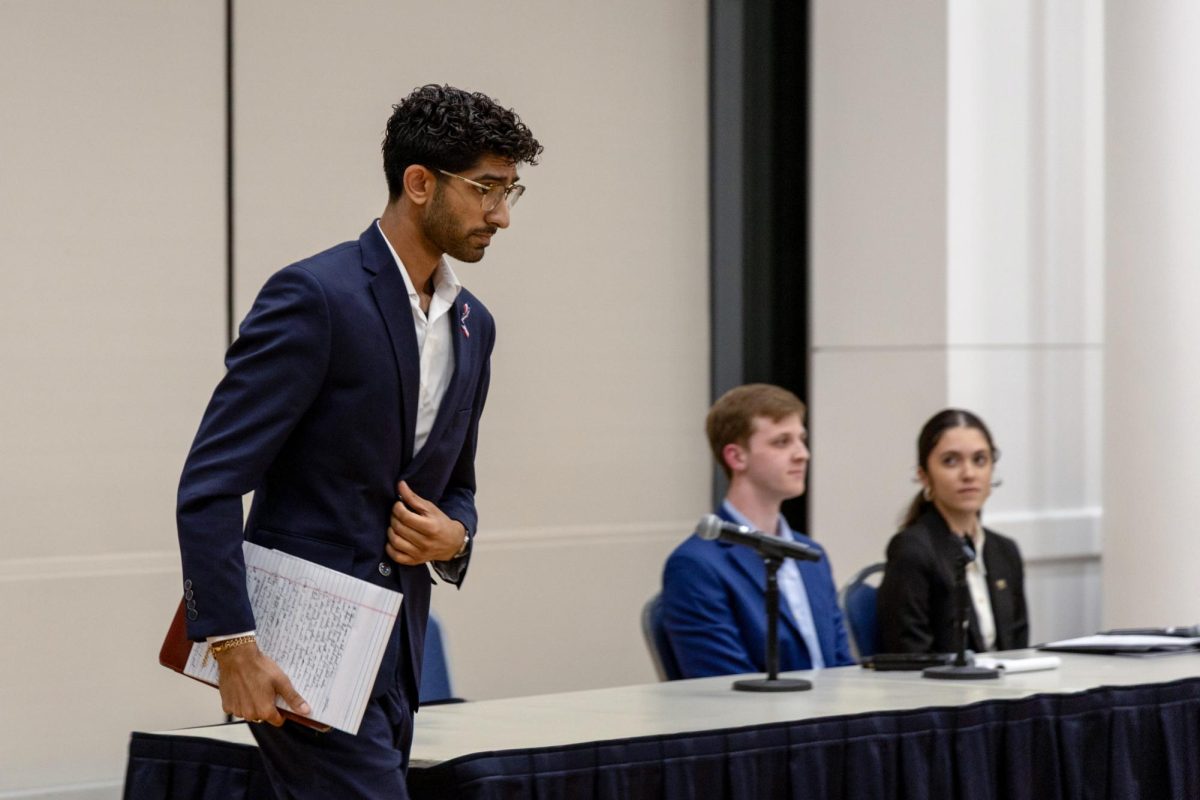Supreme Court Justice Anthony Kennedy addressed the GW Law School Thursday, giving an animated speech about judicial review and several past Court decisions.
The 73-year-old justice stood beside the podium, at times gesturing with his hands and bouncing on the balls of his feet when making an exciting point. The audience, which filled the Marvin Center’s Betts Theater, listened with rapt attention punctuated by laughter at the Justice’s jokes.
Kennedy talked first about oral arguments before the Supreme Court, which usually last one hour, with 30 minutes for each side to argue their case.
“We sometimes behave badly and interrupt” with questions, Kennedy said, drawing some laughs.
The main topic of Kennedy’s speech was judicial review, the power of a court to declare a legislative or executive act unconstitutional. Kennedy spent some time discussing Marbury v. Madison, the 1803 case that established the doctrine.
“You didn’t lose a lot of sleep over whether Marbury could be a judge. A justice of the peace? Big deal,” Kennedy said, referencing some of the controversy that sparked the case.
Instead, you were giving grave power to nine justices who could now declare invalid a statute enacted by the Congress, the president, or a state, Kennedy said.
Kennedy continued that there is one thing that ultimately checks the courts in their power, and that is the law. He laughed at his circular answer before elaborating.
“The law has an objectivity, a permanence, a history, a morality, and an ethnicity. It is knowable, it is ascertainable,” he said.
President Ronald Reagan appointed Kennedy to the Supreme Court in 1988. In his opening remarks, Law Dean Frederick Lawrence said Chief Justice John Roberts has called this era of the Court “Kennedy’s Court,” because Kennedy holds a key central vote in many recent cases.
“I’ve heard several of the justices speak, and he might be my favorite,” said Renée Gentry, a D.C.-area attorney who came to GW to hear the speech.
Gentry said she was most impressed with hearing the Justice’s take on Texas v. Johnson, which ruled that flag burning was constitutionally protected speech.
Kennedy wrote a concurring opinion in the case, which he said resulted in about 80 angry senators on the Senate floor and newspaper editorials denouncing the Court. Despite the outrage, Kennedy said he told his colleagues to “give it time.”
“Over time, the American people agree with the court,” Kennedy said.
Kennedy also touched on the Court’s declining caseload. When he joined the Court, he said, they heard about 150 cases a year. Now, they hear about 80.
“We should have 100 cases. Eighty does not work us to full capacity,” Kennedy said, adding that with fewer cases, the opinions written tend to “meet each other better.”
“They are not like two ships passing in the night,” he said.
Kennedy said one reason for the lighter caseload was Congress passing fewer laws requiring Supreme Court review.
But controversial ideas, Kennedy said, will always find their way to the Court.
Kennedy described the scene when a justices’ conference decision comes out a narrow five to four.
“There are not a lot of high-fives and thumbs-ups and black slaps. There is a moment of awe” for the process, he said.
Ultimately, there is a high level of collegiality on the Court, Kennedy said, despite some very divisive issues they decide.
“I enjoy the give and take of disagreement with my colleagues – I am a lawyer,” he said.
Kennedy closed his remarks with some insight on how cases should be decided.
“I do not think your philosophy should affect the case, the case should inform you of what your philosophy ought to be.”






